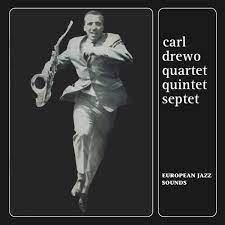
Daily Dose Of Jazz…
Karl Drewo was born May 17, 1929 in Vienna, Austria and as a child studied piano and accordion, but switched to tenor saxophone in his teens. In the late 1940s he worked with Charlie Gaudriot and Paul Reischman, followed by performing with Gert Steffens and Horst Winter in the early Fifties. He was a member of the Austrian All Stars in the mid-1950s and from 1956 to 1958 he worked with Fatty George.
He continued on by becoming a member of Kurt Edelhagen’s orchestra, where he played into the early 1970s. In the 1960s he recorded with Francy Boland, Kenny Clarke, Zoot Sims, and Jimmy Woode, among others.
After leaving Edelhagen’s group, he played with the Österreichischer Rundfunk band, and in the 1980s was a member of Peter Herbolzheimer’s ensemble. Later that decade he took a position as a lecturer at an arts school in Graz, Austria. In the Nineties he played with the Lungau Big Band, Rudolf Josel, and Rudi Wilfer.
Saxophonist Karl Drewo, often spelled Carl Drewo or Drevo, transitioned on May 10, 1995 in Wels, Austria.
More Posts: bandleader,history,instrumental,jazz,music,saxophone
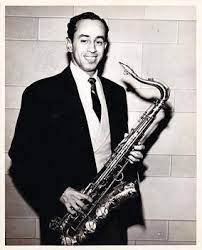
Three Wishes
The question of three wishes came up during the laughter and music one night and Paul Gonsalves simply said:
- “May I wish you happiness, prosperity, and all that you desire for here and ever after.”
*Excerpt from Three Wishes: An Intimate Look at Jazz Greats ~ Compiled and Photographed by Pannonica de Koenigswarter
More Posts: baroness,history,instrumental,jazz,music,pannonica,saxophone,three,wishes
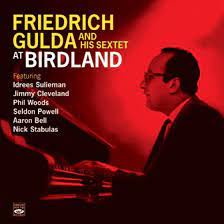
Daily Dose Of Jazz…
Friedrich Gulda was born on May 16, 1930 in Vienna, Austria and as the son of a teacher began learning to play the piano at age 7 with Felix Pazofsky at the Wiener Volkskonservatorium. In 1942, he entered the Vienna Music Academy, where he studied piano and musical theory under Bruno Seidlhofer and Joseph Marx.
During World War II as teenagers, Gulda and his friend Joe Zawinul were rebellious and would perform forbidden music, including jazz, in violation of the government’s prohibition of playing such music. Winning first prize at the Geneva International Music Competition in 1946, he began to play concerts worldwide, making his Carnegie Hall debut in 1950, and with Jörg Demus and Paul Badura-Skoda, formed what became known as the “Viennese troika”. Friedrich enjoyed a renowned classical career for years before his 1956 engagement at Birdland in New York City and at the Newport Jazz Festival.
In 1966 he organized the International Competition for Modern Jazz in 1966, and established the International Musikforum, a school in Ossiach, Austria two years later, for students who wanted to learn improvisation. From the 1950s on Gulda cultivated a professional interest in jazz, writing songs and free improvisation or open music improvisations. He also recorded as a vocalist under the pseudonym “Albert Golowin”, fooling music critics for years until it was realized that Gulda and Golowin were the same person.
In jazz, he found “the rhythmic drive, the risk, the absolute contrast to the pale, academic approach I had been taught. He also took up playing the baritone saxophone. His 1970 album, As You Like It, includes the standards Round Midnight and What Is This Thing Called Love?, as well as his own classic Blues For H.G. that is dedicated to Hans Georg Brunner-Schwer.
From the late 1960s through the 1980s he continued his straight-ahead swing and bop-based jazz often in European Jazz big bands, which he often organized yearly performances and recordings. He performed and recorded playing clavichord, percussion instruments, and a bass recorder wooden flute with musicians involved in free improvisation, including Cecil Taylor, Barre Phillips, Ursula Anders, John Surman, Albert Mangelsdorff, Stu Martin, and Fritz Pauer. He would go on to collaborate in the coming decades with Herbie Hancock, Joe Zawinul, and Chick Corea.
When the Vienna Music Academy awarded him its Beethoven Ring in recognition of his performances, he accepted it but then later reconsidered and returned it. To promote a concert in 1999, he announced his own death in a press release so that the concert at the Vienna Konzerthaus could serve as a resurrection party.
Pianist and composer Friedrich Gulda, who worked in both the classical and jazz fields, transitioned from heart failure at the age of 69 on January 27, 2000 at his home in Weissenbach, Austria.
More Posts: bandleader,composer,history,instrumental,jazz,music,piano,saxophone
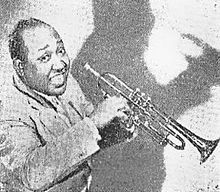
Daily Dose Of Jazz…
Bobby Martin was born on May 15, 1903. He played trumpet as a child with June Clark and Sonny Greer. By 1925 at the age of 22 he was in New York City playing and recording with Sam Wooding, as well as touring Europe through 1931.
From 1932 to 1936 he played abroad with Willie Lewis, and formed his own band after returning home in 1937. His quartet held an extended gig at the Palace in Greenwich VillageYork with pianist Richard Edwards, drummer Ural Dean, and guitarist Samuel Steede. This era of Martin’s life, as is much of his life, is poorly documented, however, because during a tour of The Netherlands at the Mephisto Club in Rotterdam, his entire book of arrangements was burned in a club fire.
Bobby continued to tour Europe into the early Forties, then held residencies in New York City and New Jersey. He opened his own club briefly in the decade as well.
He married vocalist Thelma Minor, but then left the music industry in 1944. Not much is known of him after this time, however, he never recorded as a leader and transitioned in March 1983.
More Posts: bandleader,history,instrumental,jazz,music,trumpet
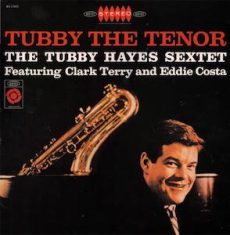
Requisites
Tubby The Tenor ~ The Tubby Hayes Sextet | By Eddie Carter
Submitted for your approval this morning is a 1962 release by British tenor saxophonist Tubby Hayes. The year before, he traveled to the United States for the first time to appear at the Half Note. This week’s album is an excellent studio session recorded at Columbia Studio A during his engagement and initially released in the U.K. as Tubbs in N.Y. Its U.S. counterpart came out the same year and is titled Tubby The Tenor (Epic LA 16023/BA 17023) by The Tubby Hayes Sextet. Hayes is in good company on this date; Clark Terry on trumpet (tracks: A2, B1), Eddie Costa on vibes (tracks: A2, A3, B3), Horace Parlan on piano, George Duvivier on bass, and Dave Bailey on drums. My copy is the 1995 Classic Records U.S. Stereo audiophile reissue sharing the original catalog number.
Side One gets underway with You For Me by Bob Haymes, a quartet feature for Tubby and the rhythm section. The saxophonist sets the scene with an unaccompanied introduction segueing into the foursome’s lively opening chorus. Tubby takes the song’s only solo and gives a swinging interpretation complemented by the trio’s spirited support leading to the closing chorus. Clark Terry’s easy-going blues, A Pint of Bitter, begins with the sextet stating the carefree melody collectively. The trumpeter is up first with a relaxing lead interpretation; then Hayes is equally laid-back on the following statement. Costa comes in next and delivers a leisurely-paced reading; then, Parlan builds a compelling finale ahead of the ending theme.
Airegin by Sonny Rollins opens with the quintet’s brisk theme. Tubby launches the solos with a spirited presentation, then gives way to Eddie, who swings freely in an exciting reading. Horace has the third spot and gives an energetic performance. George walks briskly behind him, ahead of the tenor sax’s and vibraphonist’s concise conversation preceding the reprise and climax. Side Two takes off with Opus Ocean by Clark Terry, a fast-paced thrill ride that moves quickly from the quintet’s collective theme. Hayes is off to the races wailing at top speed in the opening solo, followed by an exhilarating statement from Terry. Parlan turns the heat up on the third reading, and the front line delivers a spirited exchange before the ensemble takes the song out.
The quartet returns to put some fresh clothes on Soon, an old tune from the songbook of George and Ira Gershwin. Horace briefly introduces himself; then Tubby steps up for an excellent melody that flows seamlessly into his impressive lead statement. Horace is next and completes the solos with a festive interpretation until Tubby reappears for the song’s finish. Doxy by Sonny Rollins is misspelled here as Doxie and begins with a relaxing melody led by Hayes and Costa. Hayes is up first and gets into a comfortable groove on the opening statement. Costa comes in next for a pleasant performance, then Parlan takes a nice turn in the third reading. Duvivier wraps it up with a short walk leading to the ensemble’s finale.
Mike Berniker and Nat Shapiro produced Tubby The Tenor, and it’s unknown who the recording engineer is. However, this Classic Records reissue is an excellent recording with a superb soundstage. Bernie Grundman remastered this album, and it is an outstanding pressing using 180-gram audiophile vinyl that’s silent until the music starts. The front and rear covers also have a high gloss. Though known as a tenor saxophonist, Tubby Hayes played the flute and vibraphone equally proficiently. Until this album, I only knew of his work as a member of The Jazz Couriers with Ronnie Scott, but I am now on the hunt for more of his records. If you’re a fan of the tenor sax, I invite you to check out Tubby The Tenor by The Tubby Hayes Sextet on your next vinyl shopping trip. It’s an ideal introduction to this remarkable musician and an enjoyable album you can listen to any time of the day or evening!
~ Tubbs in N.Y. (Fontana TFL 5183/STFL 595) – Source: Discogs.com ~ Aireign – Source: JazzStandards.com ~ Columbia Studio A – Source: Tubby Hayes: How The Little Giant Conquered The Big Apple by Simon Spillett. Jazzwise Magazine, October 18, 2021. www.jazzwise.com ~ Doxy, Soon – Source: Wikipedia.org © 2023 by Edward Thomas Carter
More Posts: choice,classic,collectible,collector,history,instrumental,jazz,music,saxophone




